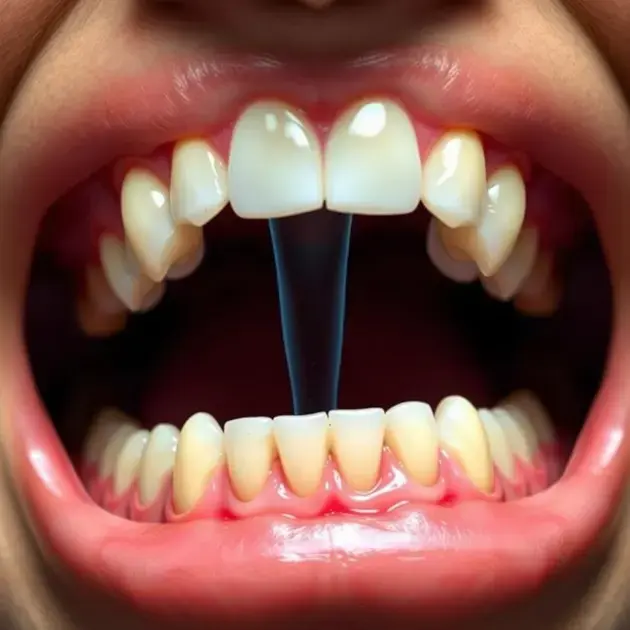Gum disease, also known as periodontal disease, is a common yet serious condition that can affect anyone. Detecting it early is key to preventing more severe health issues. Knowing how to tell if you have gum disease involves recognizing the signs and symptoms which can range from mild to severe. If you notice any changes in your gum health, such as redness, swelling, or bleeding, it’s important to take action immediately.
Recent studies have shown that gum disease can be linked to other health complications such as heart disease and diabetes, making it even more critical to maintain good oral hygiene. Regular visits to your dentist and proper daily care, including brushing and flossing, are essential preventive measures. Awareness and education about gum disease can empower individuals to take control of their oral health and ensure better overall well-being.

Early Signs of Gum Disease
Gum disease can often start without any noticeable symptoms, making it crucial to be aware of the early signs. Some common early signs of gum disease include:
1. Bleeding Gums
One of the first signs of gum disease is bleeding gums, especially when brushing or flossing. If you notice blood on your toothbrush or in the sink after brushing, it may indicate the presence of gum disease. Using a gentle toothbrush and proper brushing technique can help reduce bleeding.
2. Swollen or Tender Gums
Gums that appear swollen or feel tender to the touch can be an early indicator of gum disease. You may also notice redness or inflammation along the gum line. Keeping up with regular dental cleanings and practicing good oral hygiene can help prevent gum disease from progressing.
3. Bad Breath
Chronic bad breath, also known as halitosis, can be a sign of gum disease. Bacteria in the mouth can cause an unpleasant odor, leading to persistent bad breath. Using antibacterial mouthwash and cleaning your tongue can help combat bad breath associated with gum disease.
4. Receding Gums
As gum disease advances, you may notice your gums pulling away from your teeth, creating a receding gum line. This can make your teeth appear longer and expose the roots, leading to sensitivity. Seeking treatment from a dentist is essential to prevent further gum recession.
5. Changes in Tooth Alignment
If you notice changes in the alignment of your teeth or gaps forming between them, it could be a sign of advanced gum disease. This occurs as the supporting bone deteriorates, causing the teeth to shift. Consulting with an orthodontist to address any changes in tooth alignment is crucial in conjunction with gum disease treatment.
Understanding the Symptoms
Recognizing the symptoms of gum disease is essential for early intervention and prevention of further complications. By understanding the symptoms, individuals can take proactive steps to maintain their oral health. Some key points to consider include:
1. Regular Dental Check-ups
Scheduling regular dental check-ups and cleanings with a qualified dentist is crucial for detecting early signs of gum disease. Dentists can evaluate the health of your gums, identify any issues, and provide appropriate treatment recommendations.
2. Proper Oral Hygiene
Practicing good oral hygiene habits, such as brushing twice a day, flossing daily, and using mouthwash, can help prevent gum disease. Proper oral care can remove plaque and bacteria that contribute to gum inflammation and infection.
3. Healthy Lifestyle Choices
Adopting a healthy lifestyle, including eating a balanced diet, avoiding tobacco products, and managing stress, can positively impact gum health. Nutrient-rich foods can support overall oral health, while avoiding smoking can reduce the risk of gum disease development.
4. Educating Yourself
Being informed about gum disease symptoms and risk factors can empower individuals to take control of their oral health. Reading reliable sources such as the American Dental Association website can provide valuable information on gum disease prevention and management.
5. Seeking Professional Help
If you experience persistent symptoms of gum disease, such as bleeding gums or chronic bad breath, seeking professional help from a dentist or periodontist is essential. Early intervention can help prevent the progression of gum disease and preserve the health of your gums and teeth.
Link Between Gum Disease and Overall Health
The link between gum disease and overall health highlights the importance of maintaining good oral hygiene for your well-being. Research suggests that gum disease can impact various aspects of your health beyond your mouth. Understanding this connection can motivate individuals to prioritize their oral health. Some key aspects to consider include:
1. Systemic Inflammation
Gum disease is associated with an increased risk of systemic inflammation, which can contribute to various health conditions such as heart disease, diabetes, and respiratory issues. Managing gum disease through regular dental care can help reduce inflammation and its potential impact on overall health.
2. Immune System Response
The immune system plays a crucial role in combating gum disease and maintaining oral health. Chronic gum inflammation can weaken the immune system, making individuals more susceptible to infections and illnesses. Protecting gum health can support overall immune function and well-being.
3. Chronic Disease Connection
Studies have found associations between gum disease and chronic health conditions, including cardiovascular disease, diabetes, and Alzheimer’s disease. By addressing gum disease promptly and effectively, individuals may reduce their risk of developing or exacerbating these conditions.
4. Oral-Systemic Health Link
Researchers continue to explore the relationship between oral health and systemic health, recognizing the impact of gum disease on overall well-being. Maintaining healthy gums through regular dental visits, proper oral hygiene, and lifestyle choices can contribute to a healthier mouth and body.
5. Holistic Approach to Health
Adopting a holistic approach to health that includes oral care can provide comprehensive benefits for overall well-being. Recognizing the interconnectedness of oral health and systemic health emphasizes the importance of addressing gum disease as part of a broader health strategy.

**Recognizing the Warning Signs**
When it comes to oral health, it is crucial to pay attention to warning signs that may indicate potential gum issues. One common warning sign is bleeding gums, which can occur during brushing or flossing. Additionally, persistent bad breath or a bad taste in the mouth can be indicators of gum problems. Another warning sign to look out for is gum recession, where the gums start to pull away from the teeth.
Furthermore, if you experience swollen or tender gums, it could be a sign of gum inflammation or infection. Loose teeth or a change in your bite pattern may also signal gum issues that need to be addressed. If you notice any of these warning signs, it is important to consult with a dental professional for further evaluation and treatment.
How to Recognize the Warning Signs:
- Pay attention to any bleeding gums during brushing or flossing.
- Take note of persistent bad breath or a bad taste in the mouth.
- Check for signs of gum recession or gum tenderness.
- Monitor for loose teeth or changes in your bite pattern.
- Seek professional dental advice if any warning signs persist.
**Preventive Measures for Healthy Gums**
Maintaining healthy gums is essential for overall oral health and well-being. One preventive measure for healthy gums is to practice good oral hygiene, including regular brushing and flossing. Removing plaque and food debris from the teeth and gums can help prevent gum disease and inflammation.
Another important preventive measure is to eat a balanced diet rich in vitamins and minerals that support gum health. Avoiding sugary and acidic foods can also contribute to maintaining healthy gums. Additionally, quitting smoking and reducing alcohol consumption can help prevent gum problems.
How to Implement Preventive Measures:
- Brush your teeth at least twice a day and floss daily.
- Eat a diet high in fruits, vegetables, and whole grains.
- Avoid sugary snacks and beverages that can harm gum health.
- Quit smoking and limit alcohol intake for better gum health.
- Visit your dentist regularly for professional cleanings and check-ups.
**The Importance of Regular Dental Check-ups**
Scheduling regular dental check-ups is vital for maintaining healthy gums and overall oral health. During a dental check-up, your dentist can assess the health of your gums, teeth, and mouth, identifying any potential issues early on. Professional cleanings can also help remove plaque and tartar buildup that can lead to gum disease.
Regular dental check-ups allow for early detection of gum problems, such as gingivitis or periodontal disease, which can be treated more effectively when caught early. Your dentist can provide personalized oral hygiene recommendations and treatments to keep your gums and teeth healthy.
Why Regular Dental Check-ups are Important:
- Early detection of gum issues for prompt treatment.
- Professional cleanings to prevent gum disease and cavities.
- Personalized oral hygiene advice for better gum health.
- Monitoring overall oral health and addressing any concerns.
- Preventing future dental problems through regular preventive care.
Conclusion
Recognizing the warning signs of gum issues is paramount for maintaining optimal oral health. From bleeding gums to bad breath, these indicators should not be overlooked. Monitoring for gum recession, tenderness, or changes in teeth alignment can help in early detection and prompt treatment, underscoring the importance of consulting a dental professional for evaluation and care.
Implementing preventive measures plays a key role in promoting healthy gums. Consistent oral hygiene practices, a balanced diet rich in essential nutrients, and lifestyle choices like quitting smoking are all crucial steps in safeguarding gum health. Regular visits to the dentist for professional cleanings and check-ups further contribute to preventing gum disease and ensuring overall oral well-being.
Regular dental check-ups are vital in the ongoing maintenance of healthy gums. These visits enable dentists to identify and address gum issues early on, offering personalized advice and treatments for optimal gum health. From early detection of gingivitis to personalized oral hygiene recommendations, regular check-ups are instrumental in preventing future dental problems and preserving a healthy smile.
